US Turning Oil-Rich Nigeria into Proxy for its Africa Wars
T.J. Coles reports on what AFRICOM is doing under the cover of counterterrorism.
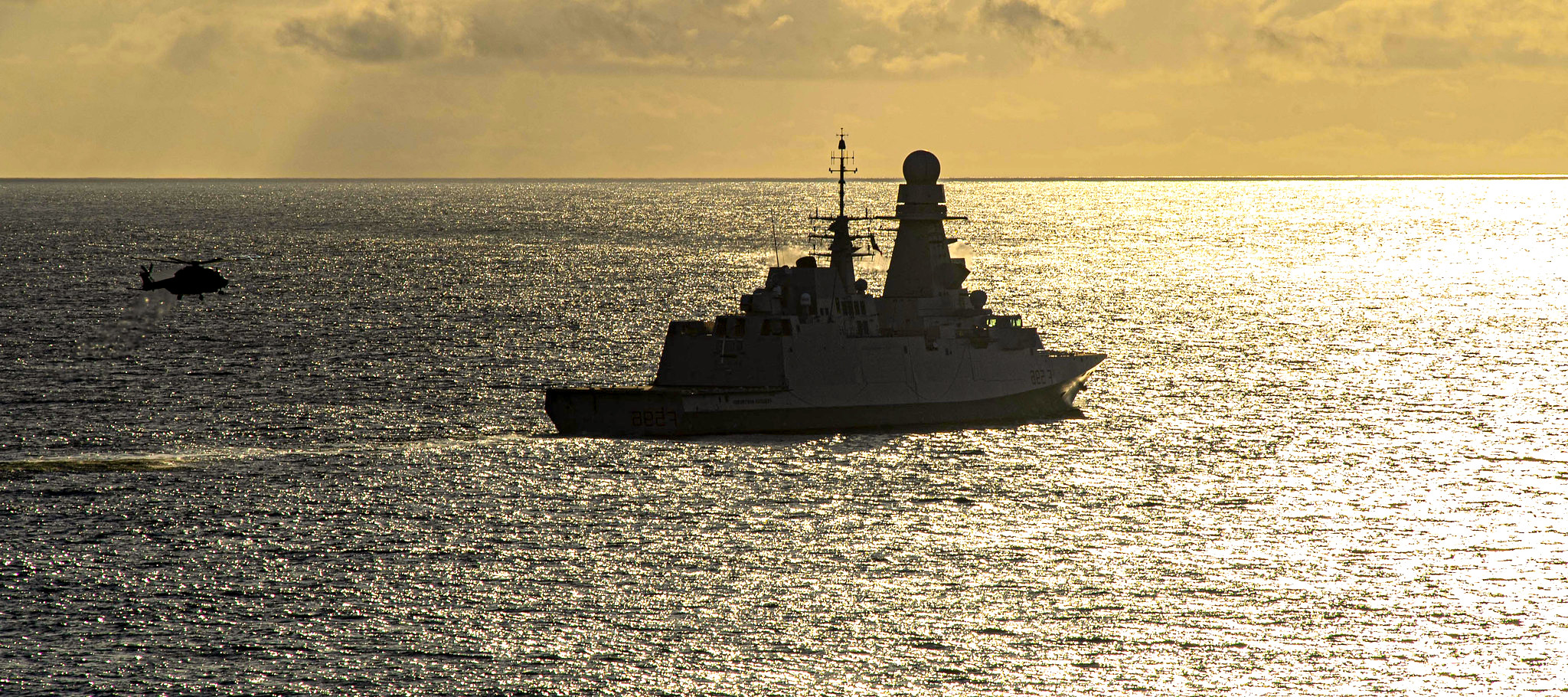
USS Hershel Williams in exercise in the Gulf of Guinea, Oct. 8, 2020. (US Africa Command)
 Last month, Nigeria’s President Muhammadu Buhari wrote an op-ed in The Financial Times. It might as well have been written by the Pentagon. Buhari promoted Brand Nigeria, auctioning the country’s military services to Western powers, telling readers that Nigeria would lead Africa’s “war on terror” in exchange for foreign infrastructure investment. “Though some believe the war on terror [WOT] winds down with the US departure from Afghanistan,” he says, “the threat it was supposed to address burns fiercely on my continent.”
Last month, Nigeria’s President Muhammadu Buhari wrote an op-ed in The Financial Times. It might as well have been written by the Pentagon. Buhari promoted Brand Nigeria, auctioning the country’s military services to Western powers, telling readers that Nigeria would lead Africa’s “war on terror” in exchange for foreign infrastructure investment. “Though some believe the war on terror [WOT] winds down with the US departure from Afghanistan,” he says, “the threat it was supposed to address burns fiercely on my continent.”
With Boko Haram and Islamic State operating in and near Nigeria, pushing a WOT narrative is easy. But counterterror means imperial intervention. So, why is the Pentagon really interested in Nigeria, a country with a GDP of around $430 billion — some $300 billion less than the Pentagon’s annual budget — a population with a 40 percent absolute poverty rate, and an infant mortality rate of 74 deaths per 1,000 live births, compared to 5.6 per 1,000 in the U.S.?
A U.S. Naval Postgraduate School doctoral thesis from over a decade ago offers a plausible explanation: the Gulf of Guinea, formed in part by Nigeria’s coastline, “has large deposits of hydrocarbons and other natural resources.” It added: “There is now a stiff international competition among industrialized nations including the United States, some European countries, China, Japan, and India.”
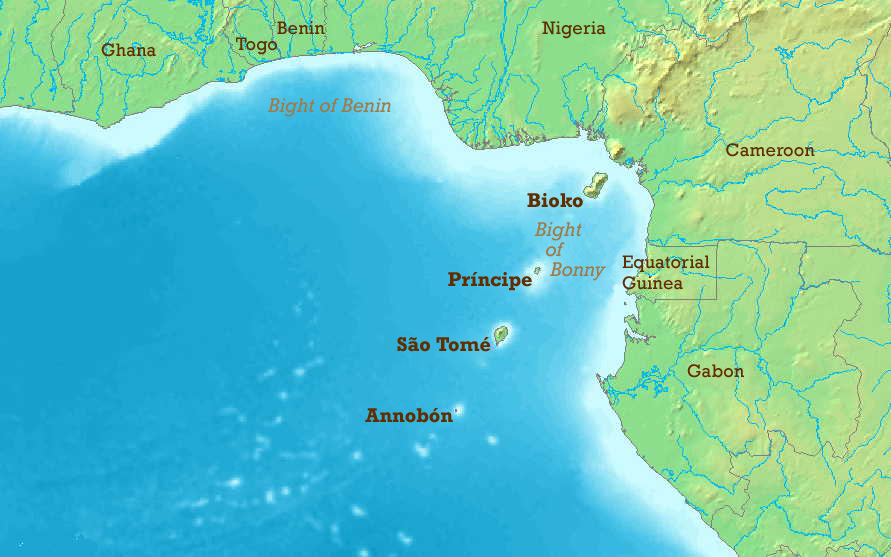
Map of Gulf of Guinea. (CC BY-SA 3.0, Wikimedia Commons)
Since then, the U.S. has been quietly transforming Nigeria’s police and military into a neo-colonial force that can support missions led by the U.S. Africa Command (AFRICOM). Buhari’s offer makes U.S. involvement in Nigeria appear as if Nigeria is asking for help, when in fact the stage is already set for AFRICOM.
The Pentagon’s broader aim is to stop China and Russia from gaining a foothold in the continent. In the meantime, it aims to crush any and all opposition groups that disrupt energy supplies so that oil giants can continue exploiting Nigeria’s resources.
Brief History of Complex Country
It’s important to get an idea of Nigeria’s ethnic and regional complexities. The country’s 206 million people, nearly half of whom are Muslim and nearly half Christian, live north of the equator in West Africa. Their country has 36 states, seven of which are coastal. The country borders Cameroon in the east, Benin in the west, Chad in the northeast and Niger in the north and northwest.
A U.S. Strategic Studies Institute report from the mid-’90s describes Nigeria as “an artificial state created according to colonial exigencies rather than ethnic coherence.” Its fragility explains the country’s susceptibility to ethnic, religious and class warfare. The majority of Nigerian Muslims are Sunni, but Islam in the country spans the spectrum, from Sufism to Salafism. The Christian population is distributed among the Protestant majority as well as Anglicans, Baptists, Evangelicals, Catholics, Methodists and Roman Catholics. Most of Nigeria’s Muslims live in the north in 12 states whose laws are based on sharia.
” Nigeria boasts hundreds of languages and ethnicities, the largest groups being the Hausa (who make up 30 percent of the population), Yoruba (15.5), Igbo (a.k.a., Ibo 15.2), and Fulani (6 percent). There are, of course, exceptions, but in general the Hausa-Fulani and Kanuri peoples tend to be Muslim and the Igbo, Ijaw and Ogoni Christian. Islam and Christianity tend to be mixed among the Yoruba. During the late-19thcentury “Scramble for Africa,” the British colonized the region, Christianizing the south and leaving in place the Islamic political structures in the north both for convenience and as a useful divide and rule technique.
Nigeria boasts hundreds of languages and ethnicities, the largest groups being the Hausa (who make up 30 percent of the population), Yoruba (15.5), Igbo (a.k.a., Ibo 15.2), and Fulani (6 percent). There are, of course, exceptions, but in general the Hausa-Fulani and Kanuri peoples tend to be Muslim and the Igbo, Ijaw and Ogoni Christian. Islam and Christianity tend to be mixed among the Yoruba. During the late-19thcentury “Scramble for Africa,” the British colonized the region, Christianizing the south and leaving in place the Islamic political structures in the north both for convenience and as a useful divide and rule technique.
Black Gold, British Rule
Drawing up “contracts” for energy companies, the Foreign Office (FO) created a monopoly for Anglo-Persian oil (later BP) and particularly for Shell. Prospecting contracts were awarded by the FO in the late-1930s, but it was as late as 1956 that financially viable amounts of black gold were struck. Most of the country’s oil is in the southern, Niger Delta region populated by the Ijaw and Ogoni peoples, hence there is little militant Islam in Nigeria’s illicit oil sector. Shell operations began in Ogoniland in 1958.
Nigeria gained slow and painful independence from Britain in 1960. Seven years later, armed Igbo fought a war of secession in the oil-rich south to try to form their own country, the Republic of Biafra. Under a One Nigeria policy, the British supported the central regime of General Yakubu Gowon during the Biafra War (1967-70). Fighting and blockade led to 3 million deaths. Biafra failed to secede.
The U.K. Labour government’s Commonwealth Minister, George Thomas, explained at the time: “The sole immediate British interest in Nigeria is that the Nigerian economy should be brought back to a condition in which our substantial trade and investment in the country can be further developed, and particularly so we can regain access to important oil installations.”
As the British Empire declined, the U.S. gradually pursued the same policy in Nigeria. At first, the U.S. considered supporting Biafra.
The Kennedy administration initiated $170 million in economic and military spending in Nigeria under a plan that continued until 1966, into the Johnson administration. William Haven North, who served as the director for Central and West African affairs for the U.S. Agency of International Development (USAID) said: “The issue of supporting Biafra was also tied up with the question of oil interests; the major part of the oil reserves in Nigeria were in the Eastern Region with substantial American oil company investments.” In 1978, the U.S. Navy’s Sixth Fleet began the regular exercises in the Gulf of Guinea that continue to the present.
Enter Uncle Sam
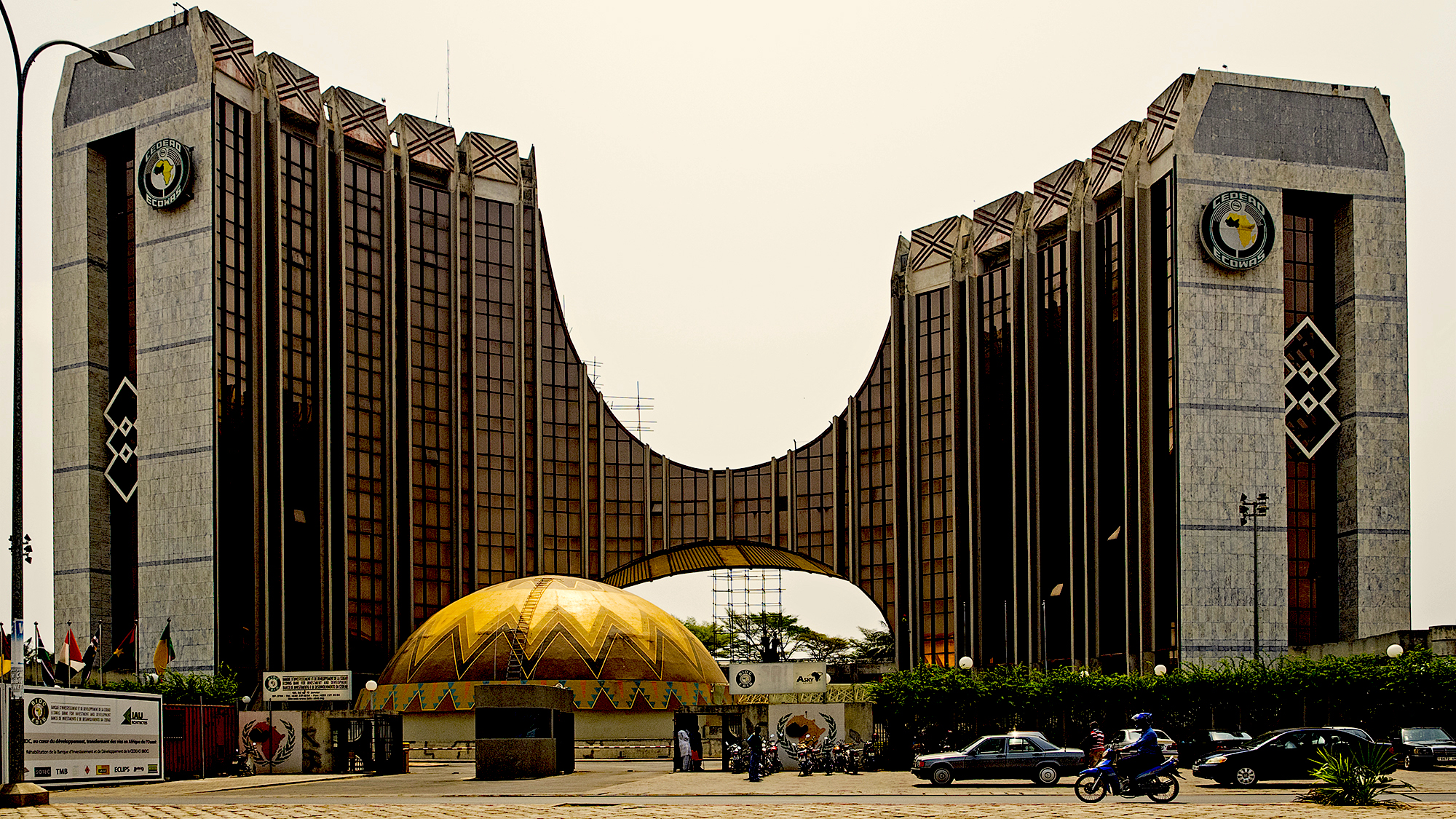
Economic Community of West African States’ Bank for Investment and Development headquarters in Lomé, Togo.(Willem Heerbaart, CC BY 2.0, Wikimedia Commons)
In 1990, the Nigeria-dominated Economic Community of West African States (ECO) established a military wing, the so-called Monitoring Group (ECOMOG). The George H.W. Bush administration contributed $100 million. The succeeding Clinton White House said that for so-called peace-keeping operations in other African countries like Liberia and Sierra Leone, “Nigeria provided most of the ‘muscle’.” At this point, the seeds were sown for Nigeria’s use as a delegate for U.S. wars in Africa.
By the dawn of the new millennium, the 3rd Special Forces Group (Army Command) was training Nigerian battalions to assist United Nations support missions. The Nigerian military enjoyed tens of millions of dollars-worth of U.S. weapons.
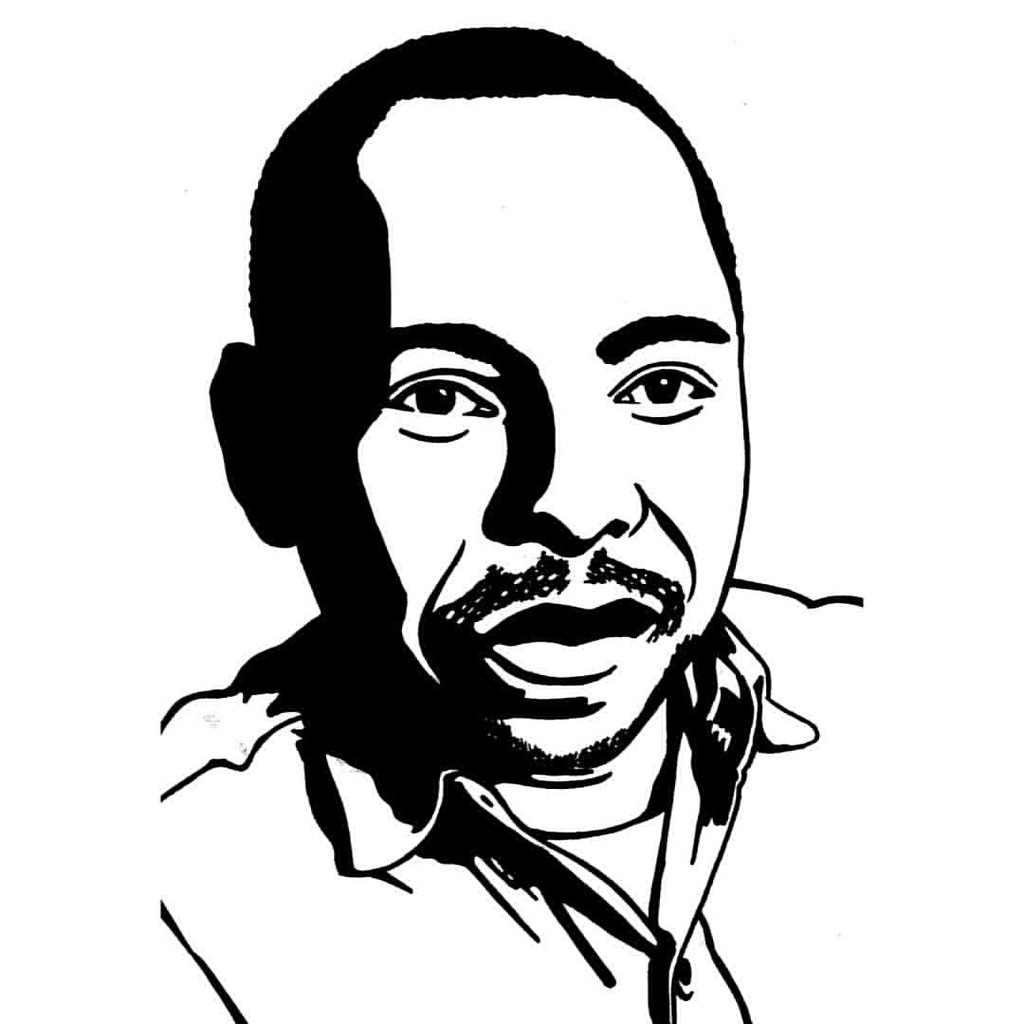
Depiction of Ogoni leader Ken Saro-Wiwa who was executed by the Nigerian government in 1995. (dignidadrebelde, Flickr, CC BY 2.0)
Meanwhile, indigenous activists suffering under oil spills and environmental destruction established the Movement for the Survival of the Ogoni People. Nine of this group’s leaders, including Ken Saro-Wiwa, were later arrested on trumped up charges and executed by the national military that had been funded by Shell to act as its own private army.
The murders sparked international outrage and activists successfully pressured the U.S. to terminate military aid. General Sani Abacha, under whose dictatorship the Ogoni Nine were hanged, established a Multinational Joint Task Force (MNJTF) to fight both activists and gangs. The MNJTF was later centered in Chad and used as a base from which to fight Boko Haram.
In 1999, Nigeria ended its military rule, at least on paper. By the mid-2000s, Human Rights Watch wrote that, under the façade of parliamentary democracy, “the conduct of many public officials and government institutions is so pervasively marked by violence and corruption as to more resemble criminal activity than democratic governance.”
With the Ogoni, Ijaw and other Niger Delta peoples crushed with force, some turned to violence. Following lobbying by Shell, Nigeria’s old colonial master, the U.K., began spending taxpayer money on military operations to counter armed groups: £12 million between 2001 and 2014, when Campaign Against the Arms Trade (CAAT) co-authored their report. CAAT documents the U.K. exportation of nearly £500m-worth of weapons to Nigeria in that period, including missiles and grenades. It cites increased U.K. arms exports as a direct reason for the failure of the southern ceasefire. U.K. “security contractors” including Control Risks, Erinys, Executive Outcomes and Saladin Security were embedded with mobile police units to crush protestors.
Nigeria & ‘War on Terror’
Western propaganda paid less attention to Shell’s systemic violence against the Ogoni and other peoples, focusing instead on the more headline-grabbing resistance, such as high-profile ransom kidnappings and pipeline disruption. State oppression in the drier, less fertile north, meanwhile, fed the narrative pushed by Islamic groups: that Western culture is toxic.
Founded in 2002 and led by Mohammed Yusuf who was later executed by the state, Boko Haram is officially called the Group of the People of Sunnah for Preaching and Jihad. It emerged in the northeastern city, Maidugari, close to Chad and Cameroon, where it set up semi-autonomous communities. Religious graduates who studied in Sudan attempted to form similar communes but were attacked by the police. In 2009, Boko Haram members allegedly fired at a police station in Bauchi. The government response was to trigger civil war.
The Multinational Joint Task Force mentioned above, is described as “notorious” in a British House of Commons Library report. It was reactivated, this time to fight the Islamists. The report also notes how the Nigerian Armed Forces terrorized the civilian population with raids, arrests and indiscriminate shelling.
The U.K. ramped up its training of Nigeria’s military while the U.S. used Chad as a base for its “war on terror” operations: the Pan-Sahel Initiative (covering Chad, Mali, Mauritania and Niger) and the Trans-Sahara Counterterrorism Partnership (which included Algeria, Morocco, Nigeria and Tunisia). AFRICOM’s initial operations in Nigeria involved maritime training and integrating the country’s forces with those of other African nations to foster pan-African military alliances.
In its early years, AFRICOM paid little attention to Boko Haram. But this changed as the profile of attacks got bigger.
In 2011, Boko Haram launched a formal insurgency. A report published that year by the U.S. House of Representatives Homeland Security Subcommittee on Counterterrorism and Intelligence outlined Boko Haram’s roots and the reasons for its popularity. They included “a feeling of alienation from the wealthier, Christian, oil-producing, southern Nigeria, pervasive poverty, rampant government corruption, heavy-handed security measures, and the belief that relations with the West are a corrupting influence.” It added that “[t]hese grievances have led to sympathy among the local Muslim population despite Boko Haram’s violent tactics.”
These grievances were met with the kind of violence that further fuels grievances.
US Escalates Involvement
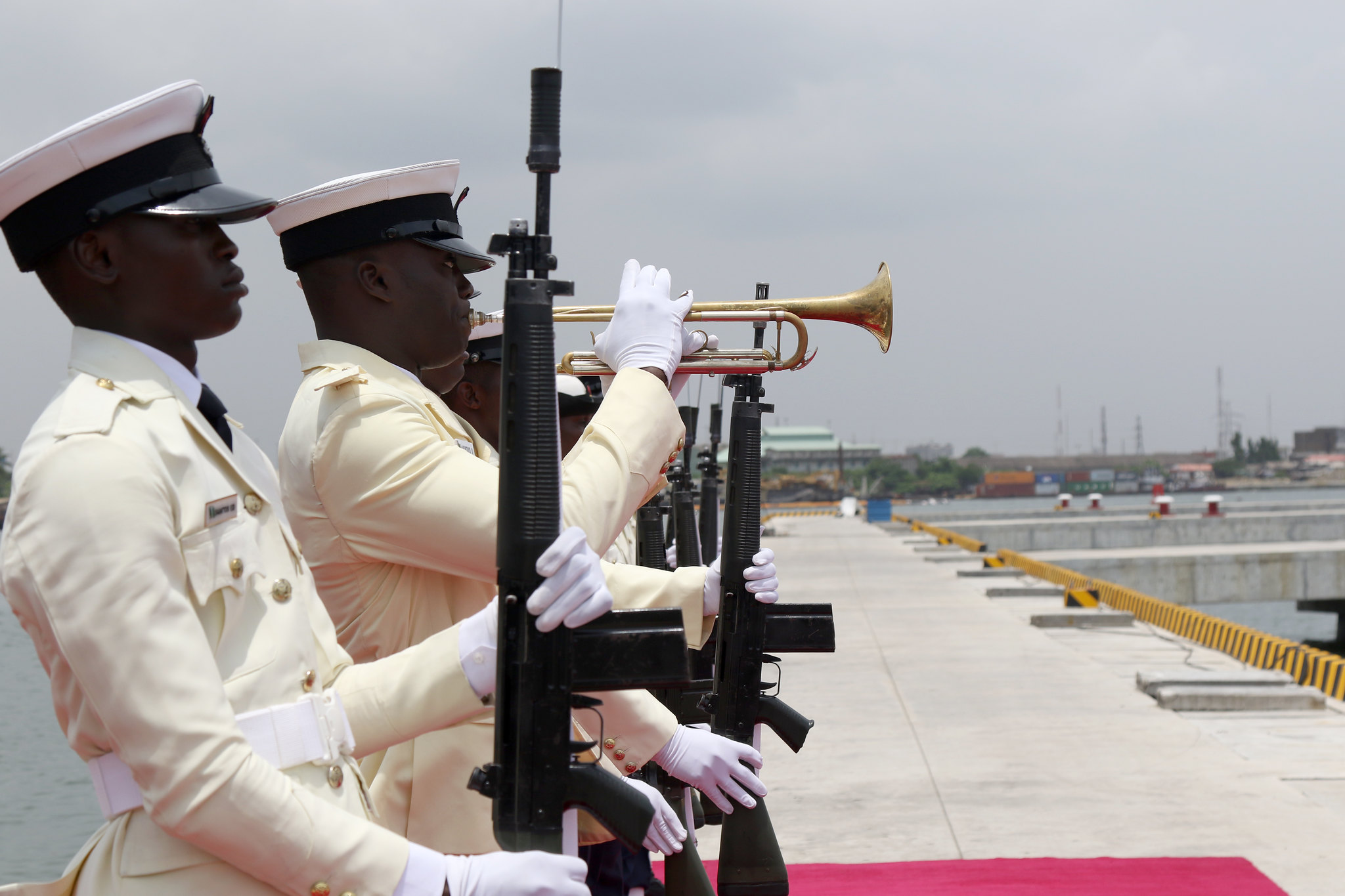
A Nigerian Navy color guard renders honors during opening ceremony for AFRICOM exercise in Lagos, Nigeria in March 2019. (U.S. Army, Alysia Brewster)
In the context of the “war on terror,” the Pentagon saw Boko Haram as an opportunity to train Nigeria’s military and employ it for its objectives. The primary U.S. goal was ensuring that the oil-rich regions did not fall into enemy hands.
The Congressional Research Service noted that by the time AFRICOM was founded in the late-2000s, Africa “supplie[d] the United States with roughly the same amount of crude oil as the Middle East.”
An Armed Services Committee report in 2011 noted: “Nigeria’s oil rich Niger Delta is a major source of oil for the United States outside of the Middle East.” The U.S. Energy Information Administration states: “Nigeria is the largest oil producer in Africa. It holds the largest natural gas reserves on the continent and was the world’s fifth–largest exporter of liquefied natural gas.” The country has 37 billion barrels of proven crude, second only to Libya, which was bombed to pieces by the U.S. and NATO in 2011.
Nigeria’s forces summarily executed Boko Haram’s leader Yusuf in 2009. A thesis published by the U.S. Naval Postgraduate School notes that in addition to the assassination, “security forces killing or displacing thousands of Nigerian Muslims, is credited with swelling [Boko Haram BH]’s ranks.”
Yusuf’s deputy, Abubakar Shekau, took over and escalated a suicide bombing campaign. The Navy thesis also notes that “the actions of BH, along with other militant groups such as the Movement for the Emancipation of the Niger Delta (MEND), have reduced the country’s oil production, displacing Nigeria from 5th to 8th on the list of America’s largest foreign oil suppliers.”
In 2013, the states of Adamawa, Borno and Yobe imposed emergency powers. The Pentagon announced a $45 million-dollar budget to counter Boko Haram by training troops in Benin, Cameroon, Chad, Niger and Nigeria. One of the consequences is that Nigeria has been transformed from a peripheral U.S. interest to a proxy force. Years of war, mostly in the north and border regions, have led to 2.1 million internally displaced people. The UN’s World Food Programme calculates that 3.4 million face hunger and that 300,000 children are malnourished.
Building a Sparta State
In June 2014, it was reported that a 650-person unit, the Nigerian Army’s 143rd Battalion, was set up on the ground and trained by U.S. Special Forces from the California Army National Guard’s Special Operations Detachment-U.S. Northern Command and Company A, 5thBattalion 19th Special Forces Group (Airborne). By then the Nigerian Army was active in 30 out of the country’s 36 states.
Chief of the U.S. Army Africa’s Security Cooperation Division, Colonel John D. Ruffing, said:
“It is not peacekeeping … It is every bit of what we call ‘decisive action,’ meaning those soldiers will go in harm’s way to conduct counterinsurgency operation[s].” One U.S. soldier said: “This is a classic Special Forces mission —training an indigenous force in a remote area in an austere environment to face a very real threat.”
In 2015, Boko Haram’s leader Shekau reportedly pledged allegiance to Islamic State, rebranding the organization IS West African Province (ISWAP). A Congressional Research Service report notes that ISWAP “has surpassed Boko Haram in size and capacity, and now ranks among IS’s most active affiliates.”
It’s not as if strategists don’t understand that violence doesn’t work. They understand that violence escalates violence which can then be used as pretexts for more violence. A U.S. Council on Foreign Relations article from 2020 notes: “the last two years have been deadlier than any other period for Nigerian soldiers since the Boko Haram insurgency began.”
As the war against Boko Haram waged on, Niger Delta gangs in the south threatened to resume attacks on oil infrastructure. U.S. “aid” expanded to include training the Nigerian Police Force (NPF) across the country. In November 2016, 66 officers graduated from the Fingerprint Analysis and Forensics training program, an initiative run by the U.S. embassy in collaboration with the Office of International Narcotics and Law Enforcement and Atlanta Police Department.
In March 2017, 28 Nigerian officers graduated from courses offered by the International Narcotics and Law Enforcement Affairs division, led by U.S. police from Prince William County, Virginia. The program also provided “equipment, training, mentoring, and capacity-building support to various Nigerian law enforcement and justice sector institutions.”
Expanding AFRICOM’s Role
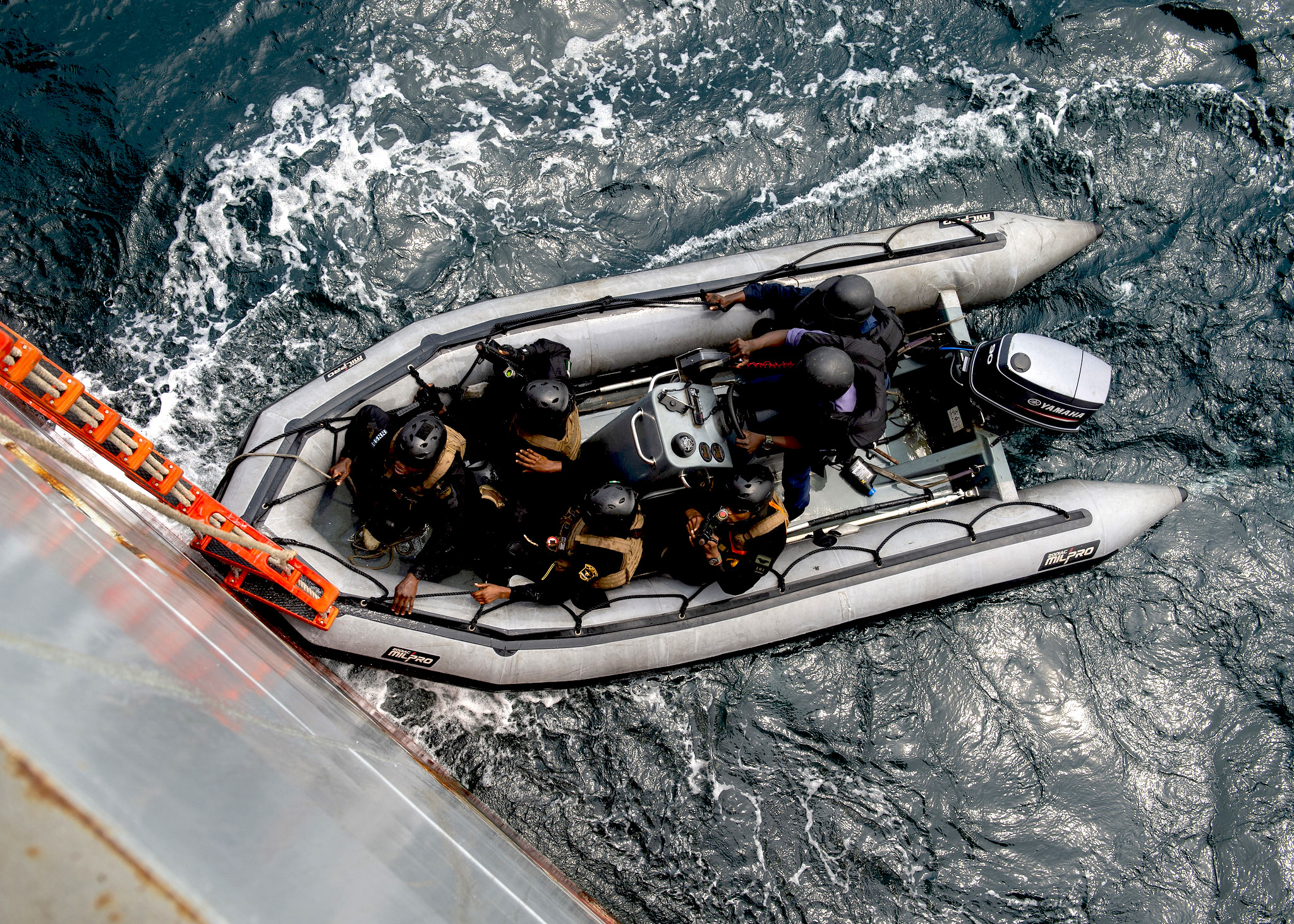
Nigerian Navy sailors board the Expeditionary Sea Base USS Hershel “Woody” Williams in a training exercise on Aug 9. (U.S. Navy, Malachi Lakey)
In what the U.S. State Department calls a “whole of government” approach, military operations continued as police training expanded. In early-2018, 12 U.S. Army soldiers, led by Captain Stephen Gouthro, trained 200 Nigerians at the Nigerian Army’s School of Infantry. Facilitated by the U.S. Army Africa, eight Security Assistance and Training Management Organization soldiers and four 1st Brigade Combat Team soldiers shared “ground-combat tactics” with the Nigerian Army’s 26th Infantry Battalion.
In July this year, U.S. Army Special Forces trained 25 officers of the Nigerian Navy Special Boat Service as part of JCET: a five-week Joint Combined Exchange Training program. The acting U.S. consulate political and economic chief, Merrica Heaton, says that the training is designed to help the Nigerian military stop crime in the Gulf of Guinea and “counter violent extremists in the Northeast and enforce the rule of law throughout the region.”
As observers seemingly spotted the top-secret U.S. stealth drone — Northrop Grumman’s RQ-180 — over the Philippines, the Department of Defense sold nearly $500 million-worth of propeller planes to Nigeria, marking what the U.S. embassy and consulate describe as a “historic level of cooperation … between the U.S. and Nigerian militaries.”
AFRICOM recently confirmed that the inauguration of 12 A-29 Super Tucanos into the Nigerian Air Force will serve a “critical role in furthering regional security and stability.”
The Pentagon allocated $36.1 million to the U.S. Army Corps of Engineers to renovated Kainji Air Base, which will host the Super Tucanos. In addition to training simulator and small arms storage units, the Base includes “aircraft sunshades, a new airfield hot cargo pad, perimeter and security fencing, airfield lights, and various airfield apron, parking, hangar, and entry control point enhancements.”
‘Gray Zone’ Warfare Against China
Having left operations to Special Forces, AFRICOM is now tasked with overseeing an expanding footprint in Nigeria. But in addition to preventing oil supply disruptions, the U.S. seeks to counter Russian but particularly Chinese involvement. According to the U.S. state-run outlet, Voice of America (VOA), the China National Offshore Oil Corporation began investing in Nigeria’s state oil sector in 2005.
A 2007 U.S. Army War College thesis expressed concern that, following “donations” of Chinese military equipment to Nigeria, China had helped the government to drill hundreds of boreholes in a goodwill gesture to provide clean drinking water. The U.S. acted to tarnish China’s image. As part of what is now called the “whole of government” approach, the U.S. 96th Civil Affairs Battalion, U.S. Army Civil Affairs and Psychological Operations Command, networked with Nigerian civilians, private industry and aid agencies. The U.S. Army War College implies that this was to psychologically counter China’s influence.
Nigeria signed a Memorandum of Understanding with China in 2018 to integrate into China’s global infrastructure and investment project, the Belt and Road Initiative (BRI). More recently, the VOA has said that China took advantage of Nigeria’s crime- and terror-related oil instability, investing billions of dollars in oil to stabilize supply lines.
From the U.S. military perspective, this so-called political warfare creates what they famously call a “gray zone” of conflict in which areas traditionally thought of as economic and civilian are weaponized.
Analyst Kaley Scholl of the Assistant Secretary of the Navy for Research, Development and Acquisitions writes that in one war game, the 91stCivil Affairs Battalion coordinated with the 3rd Special Forces Group to uncover “a Chinese conglomerate active in Nigeria who announced a deep-water port being constructed in one month as part of China’s BRI.” In the war game, U.S. PSYOPs beat back the Chinese.
Scholl claims that “Chinese gray zone operations are eroding the US’s legitimacy and challenging the liberal rules-based world order.” In reality, U.S. imperial aggression and wars by proxy erode whatever legitimacy Pentagon planners think they have.
But such analysts seem to forget that both the U.S. and China are armed with nuclear weapons and possess the intercontinental ballistic missiles capable of delivering them. The Pentagon might consider Nigeria to be just another pawn in the new cold war chess game. However, any escalation of tensions in flashpoints, like Taiwan, could unintentionally trigger nuclear catastrophe. This appears to be a risk the Pentagon is willing to take to enforce “full spectrum dominance.”
T.J. Coles is a postdoctoral researcher at Plymouth University’s Cognition Institute and the author of several books, the latest being We’ll Tell You What to Think: Wikipedia, Propaganda and the Making of Liberal Consensus.
This article is from The Grayzone.
https://consortiumnews.com/2021/09/23/us-turning-oil-rich-nigeria-into-proxy-for-its-africa-wars/




Geen opmerkingen:
Een reactie posten